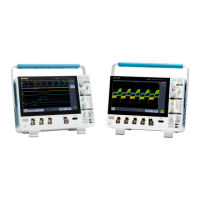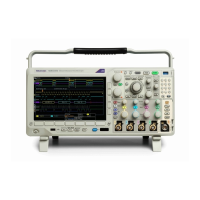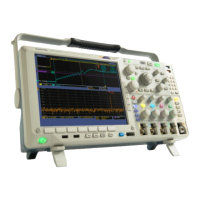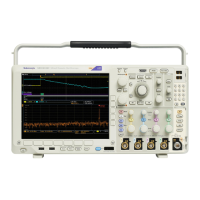Commands Listed in Alphabetical Order
Arguments
ISO sets the CAN
FD standard to ISO CAN FD (11898-1:2015)
NONISO sets the CAN FD standard to non-ISO CAN FD (Bosch:2012)
Examples
BUS:B1:CAN:FD:STANDard ISO sets the CAN FD standard to ISO CAN FD.
BUS:B1:CAN:FD:STANDard? might return :BUS:B1:CAN:FD:STANDARD
NONISO, indicating that the CAN FD standard is non-ISO CAN FD.
BUS:B<x>:CAN:PRObe
Specifies the probing method for the CAN bus.
Conditions
This command requires a DPO4AUTO or DPO4AUTOMAX application
module for all 4000 series models, or the MDO3AUTO application module for
MDO3000 series models.
Group
Bus
Syntax
BUS:B<x>:CAN:PRObe {CANH|CANL|RX|TX|DIFFerentia l}
BUS:B<x>:CAN:PRObe?
Arguments
CANH specifies the single-ended CANH signal, as specified by the CAN standard.
CANL specifies the single-ended CANL signal, as specified by the CAN standard.
RX specifies the receive signal on the bus side of the CAN transceiver.
TX specifies the transmit signal.
DIFFerential specifies the differential CAN signal.
BUS:B<x>:CAN:SAMPLEpoint
Specifies the sampling point, as a percent, to sample during each bit period for
the CAN bus.
Conditions
This command requires a DPO4AUTO or DPO4AUTOMAX application
module for all 4000 series models, and the MDO3AUTO application module
for MDO3000 series m
odels.
Group
Bus
2-170 MDO4000/B/C, MSO/DPO4000B and MDO3000 Series Oscilloscopes Programmer Manual
